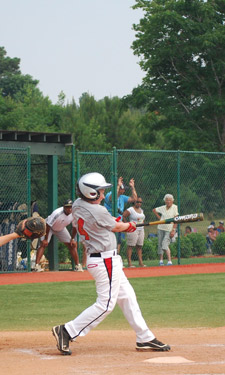 BJ is a happy, healthy sixth-grade boy who plays travel baseball and enjoys everything life has to offer. He and his family and friends are grateful for this as they know all too well that life is precious, and that childhood cancer is a real threat to the happiness and lives of our youth.
BJ is a happy, healthy sixth-grade boy who plays travel baseball and enjoys everything life has to offer. He and his family and friends are grateful for this as they know all too well that life is precious, and that childhood cancer is a real threat to the happiness and lives of our youth.
In May 2010, while playing baseball at Wills Park in Alpharetta, Georgia (just outside of Atlanta), BJ’s coaches noticed that this normally very energetic boy was turning down opportunities to pitch and seemed to get fatigued just running bases. BJ also complained to his parents of headaches and other pains. Over the course of the next few weeks, he went to the doctor repeatedly for testing, including blood tests, an MRI, and a CT Scan. On May 30 it was confirmed—BJ had a very aggressive form of childhood cancer called Burkitt’s Leukemia. His family’s life, as they knew it, stopped.
BJ's baseball league, the Wills Park Youth Baseball Association (WPYBA), rallied around him. They were already very familiar with the prevalence of childhood cancer through their involvement with Curing Kids’ Cancer, a nonprofit organization whose mission is to find cures for pediatric cancers in our lifetime. Curing Kids’ Cancer raises money to fund the most promising pediatric cancer research—the kind of research that is truly saving lives.
For years, WPYBA has been joining other leagues around the country in promoting the Coaches Curing Kids’ Cancer (CCKC) program among its teams. These teams are donating to CCKC in honor of their coaches at the end of the season in lieu of a traditional gift. The coach receives a great Curing Kids’ Cancer gift (t-shirt, hat, or whistle) along with a certificate letting the coach know the team has donated to Curing Kids’ Cancer in the coach’s honor. This money then goes to fund cutting-edge pediatric cancer research, and the kids on the team learn about giving back. It is a win/win situation for everyone!
It may seem ironic that Wills Park Youth Baseball was a supporter of Curing Kids’ Cancer and then one of their own was diagnosed with this awful disease. But, it may also seem inevitable as 1 in 300 children are diagnosed with cancer before the age of 21. With thousands of children playing in a league, it is likely that childhood cancer will hit home.
BJ underwent seven months of very harsh treatments that left him beyond sick, with his immune system seriously compromised. He spent much of those seven months confined to a room at Children’s Healthcare of Atlanta’s Aflac Cancer Center. He received the best treatments available, but they certainly took their toll. Finally, on December 18, 2010, BJ had his last treatment, and has been in remission ever since.
Unfortunately, not all children are as fortunate as BJ. In the past three decades, there has been tremendous research progress on childhood cancer. It has gone from an average survival rate of barely 25 percent to an average of more than 75 percent. But that still means that one in every four children who are diagnosed will die. More funding for research is needed in order for this to improve, and Curing Kids’ Cancer is working on it.

